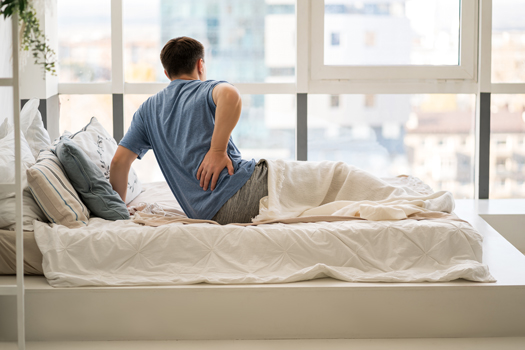
Sciatica is one of the most commonly experienced sources of lower back and radiating nerve pain. It can also be triggered by many different sources. Understanding what tends to trigger your sciatica is a good way to improve your results with physical therapy and other remedies that are typically recommended based on your symptoms and other patient-specific factors. This article explains what may trigger sciatica and how it can possibly be resolved
Chronic Stress
When the body is under stress, circulation is affected. This means not as much oxygen is being sent where it is supposed to go—namely, the sciatic nerve. When this happens, you may notice an increase in symptoms. Minimize this issue by trying to keep stress at a lower level.
Poor Posture Habits
If you do not maintain proper posture, you may experience sciatica flare-ups. These can typically be a result of the way you sit and how long you sit. Reduce this particular risk by sitting up straight, not excessively leaning, and making an effort to get up and take breaks when sitting for longer periods.
High Heels
Wearing high heels also has the potential to affect the spine in several ways. Excessively high heels throw off the body's natural balance. When this happens, other muscles must compensate for the change in weight distribution and balance.
Excess Weight
If you are carrying some extra weight, your sciatic nerve may become irritated. Part of the reason is because excess weight increases the risk of having diabetes. With conditions of this nature, circulation is affected. When circulation is affected, the sciatic nerve does not get the nutrients it needs, and if this occurs regularly, you will notice flare-ups. Even if diabetes is not an issue, extra weight can place added stress on muscles around the sciatic nerve, which could contribute to soft tissue inflammation.
Pregnancy
Being pregnant also changes weight distribution in the body. As a result, you may notice sciatica flare-ups as your pregnancy advances. If this happens, the symptom spikes should be less of an issue post-pregnancy. In the meantime, minimize your discomfort by watching your posture and trying to get some exercise based on what your doctor deems appropriate and safe for you. Exercise helps with flare-up pain management due to the release of hormones that have a natural pain-relieving effect.
Being Less Active
If you do not exercise enough or engage in regular physical activity, muscles around the sciatic nerve can become weak. This, in turn, increases the risk of inflammation from added stress on muscle tissues. The resulting inflammation then irritates the sciatic nerve.
Reduce this particular sciatic trigger by making an effort to be more active. Even engaging in a hobby like gardening or golf can be a good way to keep muscles healthy and sciatica flare-ups at a minimum.
Not Lifting Heavy Objects Properly
If you regularly lift heavy objects around the house or at work, you may notice sciatica flare-ups that cause low back pain. The reason here is because improper lifting stresses lower back muscles, and the resulting inflammation can affect the sciatic nerve. Remedy this situation by lifting with your legs and hips and not your lower back. Also, keep your back straight while carrying what you are moving or lifting.
Patients who have had discectomies for herniated discs may experience sciatica if their discs reherniate, which often occurs if there is a large hole in the outer ring of the disc after surgery. Fortunately, there is a new treatment shown to reduce the risk of reherniation by closing the hole in the disc after a discectomy. This treatment is done immediately following the discectomy—during the same operation—and does not require any additional incisions or time in the hospital. Barricaid was proven 95 percent effective in a study of over 500 patients, meaning 95 percent of patients did not experience a reoperation due to reherniation in the two-year study time frame.
To learn more about the Barricaid treatment, ask your doctor or contact us at 844-288-7474.
For full benefit/risk information, please visit: https://www.barricaid.com/instructions.


Comments